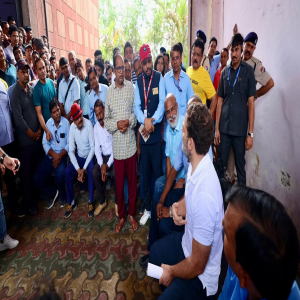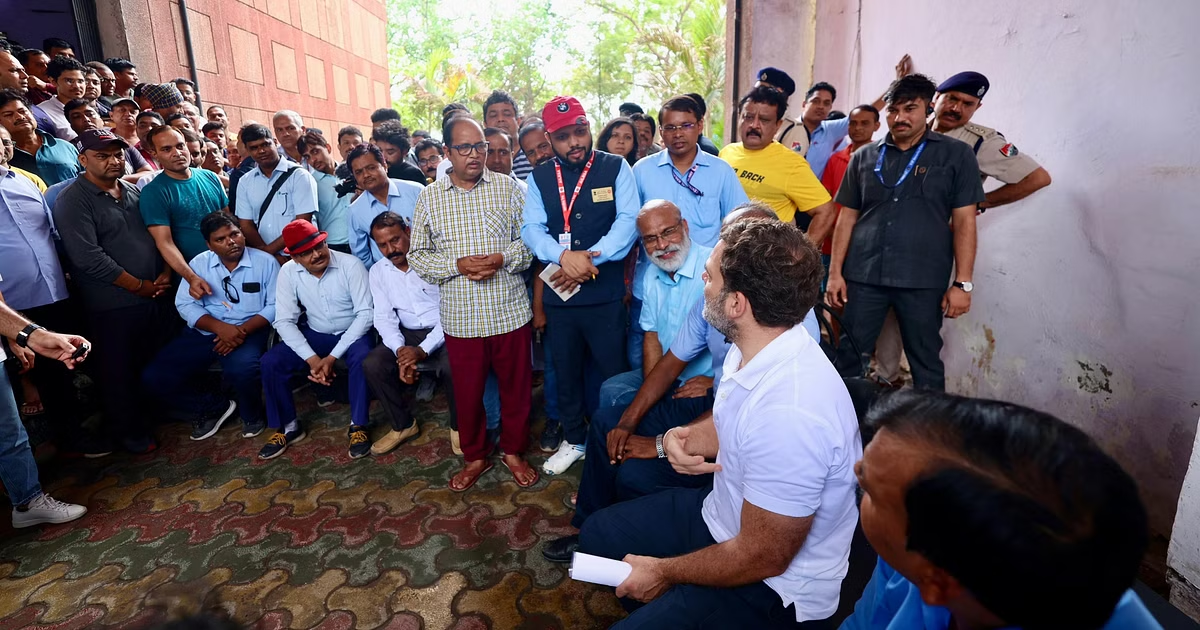
 A. J. Philip
A. J. Philip

Dear Shri Rahul Gandhi,
Please accept my hearty congratulations on becoming the Leader of Opposition (LoP) in the Lok Sabha. As you mentioned in the House, you are not just the leader of the Congress but of the whole Opposition. It is clear that you are taking your new job seriously. You have visited trouble spots like Hathras in UP and Manipur in the Northeast to offer care and concern to the affected people.
However, what encouraged me to write this letter is your recent visit to the facility at the New Delhi Railway Station, where engine drivers, now known as loco pilots, can rest before and after their duty. One of my relatives was a loco pilot, who told me about such facilities available at all important stations. He also mentioned that the maintenance was not up to par.
Immediately after your visit, the Railway authorities inspected the facility and took steps to improve it. They were afraid that you might raise the issue. I realised that you are no longer just an MP but a powerful Voice of the People.
In the Roman Empire, there was such an office known as the Tribune. Its job was to hear the people's grievances, bring them to the notice of the government, and find a solution. That is why when Dyal Singh Majithia started a nationalist newspaper in Lahore to counter the British-owned 'The Civil and Military Gazette', he named it The Tribune.
Why I write this letter is to bring to your kind attention a serious anomaly in the GST system. As you were an MP from Wayanad in Kerala, I am sure you are aware of the reading habits of the people in that state. It has the largest number of libraries in the country. Kozhikode was recently declared the first City of Literature in India by UNESCO. The city reportedly has 550 libraries and the largest per capita circulation of newspapers.
Last month, I travelled by train to the Kayamkulam-Kozhikode sector several times. I was disappointed to see not a single person reading a newspaper or magazine on those trains. The passengers were all busy fiddling with their mobile phones. Newspapers may not admit it, but the fact remains that their circulation has fallen considerably.
Almost all Malayalam newspapers carry a full page of obituary notices, which are free to subscribers. The relatives of anyone who passes away are guaranteed a free obituary notice with the deceased's picture. When an elderly person dies, it can be assumed that the newspaper has lost one subscriber. To recall, when a Bhadralok died in Kolkata, The Statesman lost one copy.
It is said that our former President, APJ Abdul Kalam, used to work as a newspaper boy in his youth. Today, newspaper agents struggle to find boys willing to deliver newspapers in the morning, rain or shine. In another five years, there will be no newspaper boys to distribute newspapers in Kerala.
You may like to know that a Malayalam film titled 'Newspaper Boy' was released in 1955. It was the first neo-realistic film in the language. It is the story of Appu, who loses his parents to poverty. He goes to Madras in search of greener pastures but returns disappointed to become a Newspaper Boy to feed his siblings. Very soon, there will be a film on the death of newspaper distribution.
It is not that Malayalis have lost their appetite for news. They get news through various other means, including online newspapers. Every newspaper in Kerala or, for that matter, in the country has a presence on the Internet. Recently, the newspaper agent who delivers to our society in New Delhi complained that it has become uneconomical to hire someone to distribute newspapers, as the number of subscribers continues to decrease each month.
I have also shifted to online newspapers. The other day, The Hindu made an offer of a one-month subscription at Re 1. To avail of it, one has to pay Rs 298 per month, deducted from the credit or debit card until the subscription is cancelled. The monthly subscription includes a GST of Rs 45.61.
The Hindu also offers different types of subscriptions through which readers can access the Business Line and the Frontline. For instance, one-year access to The Hindu costs Rs 1399, including a GST of Rs 213.41. Another subscription that provides access to the Business Line and the Frontline costs Rs 2799, including a GST of Rs 426.97.
Let me confess that this GST put me off, and I did not subscribe to the paper. Do you know why I object to it? In the early fifties, there was a finance minister in the Travancore-Kochi government whose name I have forgotten. He imposed a heavy sales tax on books and periodicals.
The publishers, led by DC Kizhakkemuri, approached the minister, who refused to budge. They approached Chief Minister AJ John, who quoted the dharma of the coalition and told them that he could not intervene. The finance minister was anti-Communist. The Communist ideology was getting popular in Kerala. The minister thought that the more people read, the more they became Communists.
He wanted to dissuade people from reading books and periodicals. With nothing else possible, DC Kizhakkemuri, who set up the first cooperative venture to publish books in Kerala, met your great-grandfather, Prime Minister Jawaharlal Nehru. Nehru, an author whose books "The Discovery of India," "An Autobiography," and "The Glimpses of World History" were bestsellers, understood DC better than anyone.
He abolished the tax on books, newspapers, and periodicals. His argument was that it was the responsibility of the government to promote literacy and, therefore, encourage the publishing industry. Nobody dared to change this policy until Narendra Modi arrived on the scene in 2014.
I am personally in favour of newspapers going digital. Nearly 85 per cent of the cost of production of a newspaper can be saved if printing and distribution are stopped. Digital newspapers are environment-friendly and have unlimited reach. A subscriber in Alaska or Gibraltar can read a newspaper published in Rae Bareli the moment it is uploaded to the Internet.
The government should encourage, not discourage, digital publications. You should demand the total abolition of GST on digital newspapers. Nehru abolished all taxes on books. What I said about newspapers is true for book publishing as well.
In the West, the sale of printed books has been declining, while the sale of digital versions, like Kindle editions, has been increasing. Today, the publishing industry in India is in a deep crisis. Book sales have not been increasing, and more people are shifting to the digital world to read books. I prefer to buy the Kindle version of a book rather than the printed version because I can increase the font size, carry it anywhere, and read it wherever it is convenient, like while waiting for a doctor's appointment.
The government has introduced a weird system of taxation. If a book is published only electronically, there is a GST of 5 per cent. To have the book freed from GST, the publisher must also produce a printed version. In other words, the government, which purportedly seeks to promote digitisation, promotes printing instead. There is a hidden purpose. The government has imposed a GST on the paper used for printing books. I am not sure whether GST applies to the newsprint used for printing newspapers, but this adds to the cost of books, indirectly taxing them.
Russia was the first country Modi visited after becoming Prime Minister for the third time. It has 100 per cent literacy. Of course, Russia became a Communist nation long before India became independent, and it was also a superpower, so they are not comparable. Let's compare India with China, which became "independent" around the same time. Their economic conditions were also the same. Today, the literacy rate in China is 97 per cent, while in India, it is only 74 per cent. Our country is behind Rwanda, Burundi, Egypt, and Bangladesh, not to mention Ukraine, where both men and women are 100 per cent literate.
India has the world's single largest population of illiterates! This underscores the urgent need to promote literacy. Printing and publishing of newspapers, periodicals, books, textbooks, fiction, and non-fiction should be exempt from GST. Tax is also levied on royalties paid to authors.
Authors receive a pittance as royalty. I have handled the royalty received by Prof. Amartya Sen, as he had bequeathed it to a Trust. He might be getting a decent amount, but the vast majority of authors in India do not receive any royalties. Even if they do, it is not sufficient to make a living. The number of authors who can lead a decent life with the royalties they receive may not even reach hundreds.
So, why tax them? In any case, they are expected to file income tax returns and will have to show the income in their returns. The loss the government of India would suffer by abolishing GST on digital newspapers, journals, books, etc., would be negligible compared to the support it would give to efforts to make the nation 100 per cent literate. Let everyone from Kanyakumari to Kashmir be able to read and write. This will go a long way in the development of the country, just as the promotion of education during the Meiji rule in Japan transformed it into a modern, industrially and scientifically developed nation.
Since I am on the subject of taxation, let me bring to your notice a dichotomy in tax collection. Recently, the wages under the Mahatma Gandhi National Rural Employment Guarantee Act were revised. According to the wage revisions, the highest rate of wage, Rs. 357 per day, has been fixed for Haryana, and the lowest wage, Rs. 221 per day, has been fixed for Madhya Pradesh and Chhattisgarh.
Recently, I visited Sehora in MP, where people consider themselves lucky if they get 100 days of work under the employment guarantee scheme. Now, if a worker who gets Rs. 221 in MP buys a kilogram of Arhar or Toor Dal from Big Bazaar, he will have to pay Rs. 217 minus a 3 per cent discount. To be fair to the Modi government, the GST on Dal, rice, or spices is the same for Mukesh Ambani as it is for the worker in MP or Chhattisgarh. Is this a uniform application of the GST?
Of course, there are fair price shops, but they don't stock many essential commodities like a matchbox. There is a strong case for revising the nation's direct and indirect tax policies.
Someone sent me a video of the invitation card that Ambani sent to his friends and relatives for his son's wedding, scheduled for July 12. It was disgusting, to say the least. With the kind of money he spent on each card, a poor girl could have been married off. It's the skewed tax policy that allows people like Ambani and Adani to become richer than many states. At this rate, they may become richer than the country.
I would suggest that you read Thomas Piketty's book, Capital in the Twenty-First Century, which is an excellent recapitulation of the origin of inequality in wealth, its decline during the two world wars, and its return thereafter. It is as riveting as Jane Austen's novels, which he often quotes.
The Bible tells the story of Zacchaeus, the tax collector who became rich by cheating people. Let our government be like the reformed Zacchaeus, who later distributed his ill-gotten wealth among the needy. In other words, we should have a just taxation policy.
Therefore, I urge you to use your influence and leadership to address this issue. Eliminating GST on books and periodicals would honour Nehru's legacy and promote knowledge and literacy, which are fundamental to the progress of our nation.